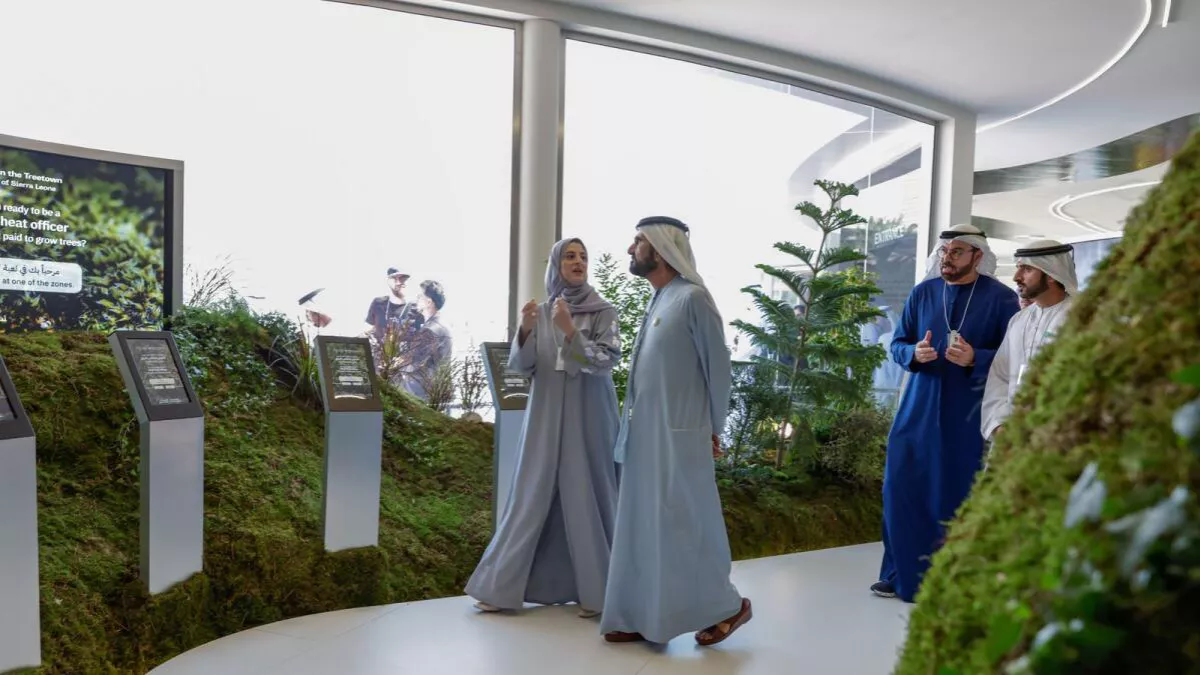
His Highness Sheikh Mohammed bin Rashid Al Maktoum, Vice President and Prime Minister of the UAE and Ruler of Dubai, accompanied by Sheikh Hamdan bin Mohammed bin Rashid Al Maktoum, Crown Prince of Dubai and Chairman of The Executive Council of Dubai, launched the fifth edition of ‘Edge of Government’ exhibition as part of the preliminary day activities of the World Government Summit (WGS) 2023 to be held in Dubai from February 13-15.
His Highness reviewed the key objectives of this year’s ‘Edge of Government’ platform, which seeks to showcase nine of the most innovative initiatives developed by governments around the world, including in the USA, Serbia, Estonia, Finland, France, Sierra Leone, Chile, Colombia and the Netherlands.
Over 1,000 entries from 94 countries were submitted to the Mohammed bin Rashid Centre for Government Innovation (MBRCGI) and the Organization for Economic Co-operation and Development (OECD) through the Observatory of Public Sector Innovation. The entries are evaluated based on their novelty, scalability, and impact.
Sheikh Mohammed was briefed on the partnership between the OECD's Observatory of Public Sector Innovation and MBRCGI. The two entities have been working on a series of reports about government innovation since 2016. To date, 11 reports have been issued with the aim of promoting a culture of innovation.
The UAE, under the leadership of UAE President His Highness Sheikh Mohamed bin Zayed Al Nahyan, and the directives of Sheikh Mohammed bin Rashid, is always keen to host global events that seek to encourage governments to establish a culture of innovation to help build a better future for people around the world.
The fifth edition of ‘Edge of Government’ focuses on innovating through optimising the use of natural elements to reimagine services, create new infrastructure, build collective value and develop new visions for the future.
The launch of the platform was attended by Sheikh Ahmed bin Saeed Al Maktoum, President of the Dubai Civil Aviation Authority, and Chairman and Chief Executive of Emirates Airline and Group; Mohammad bin Abdullah Al Gergawi, Minister of Cabinet Affairs and Chairman of the World Government Summit Organization; and Omar bin Sultan Al Olama, Minister of State for Artificial Intelligence, Digital Economy and Remote Work Applications, and Managing Director of the WGS.
The exhibition showcases the ‘Grow Your Own Cloud’ project, which was developed by City of The Hague in the Netherlands. The DNA of plants and trees can possibly store up to 50 times more information than our own and ‘Grow Your Own Cloud’ has developed a technology that stores data inside the genomes of these organisms.
The Secretary of Women's Affairs in the Bogota Mayor's Office of the Colombian government created the ‘Bogota Care System’. The initiative supports the government’s agenda to redesign its care model in Bogotá. With over 300,000 services already in place, the Bogotá Care System has helped thousands of caregivers to pursue an education, generate income and take care of themselves.
The government of Sierra Leone launched the ‘Freetown the Treetown’ campaign, which aims to engage residents in climate action through planting a lot of trees. A Chief Heat Officer from the community plays a key role in ensuring the trees are well taken care of and maintained. Through the campaign, residents create a digital record of each newly planted tree using the smart application, and they get a fee in exchange for watering and caring for seedlings. Since its launch, the campaign, which is a community-driven initiative, helped plant 560,000 trees, with the survival rate of newly planted trees reaching 82%. This model also helped create 1,000 new green jobs in Sierra Leone.
The Chilean government has developed ‘Protecting Neurorights’ to protect nerve cells. It is the first country in the world that proactively amended its constitution to safeguard the mental privacy, free will and equal treatment of citizens.
The government of Estonia created a model that allows the population to access government services through a virtual assistant as part of a first-of-its kind national campaign ‘Donate your Speech’. The virtual assistant has been trained to recognise different dialects in Estonia, strengthening the country's efforts to preserve local identity in the digital world.
‘Edge of Government’ also presented ‘UrbanistAI’, a project pioneered by the Finnish city of Jyväskylä, which allows residents to visualise their ideas and apply them using artificial intelligence technology. The initiative enhances the participation of individuals in government decision-making and translates aspirations into concrete initiatives.
The French government and OpenFisca introduced the platform ‘Mes Aides’. They enable laws to be communicated as electronic codes that can be read digitally using free applications. The initiative informs the population of their rights and duties under the new laws. More than 2,300 young people use Mes Aides daily.
‘Edge of Government’ is also showcasing ‘Tertius’, a platform developed by the City of Washington DC, PlatformOS. It reimagines how inspections are conducted by facilitating the process of hiring independent building inspectors affiliated with local authorities. The platform uses geolocation to check-in on the hired inspectors and makes sure all the inspections are carried out properly and on time. It also helps to process inspection reports to boost transparency and reduce the period for submitting and clearing the inspection request from four weeks to just two days.
The ‘Edge of Government’ is also showcasing the ‘National AI Platform’, developed by the Serbian government, which is based on a new strategy that aims to develop a supercomputer that allows students, scientists and start-ups to develop artificial intelligence applications for free. To date, the device has allowed more than 200 experts to develop products and expertise, which has helped increase employees in the Serbian ICT-sector by 50 per cent compared to 2016, making it the country’s largest net export branch.
